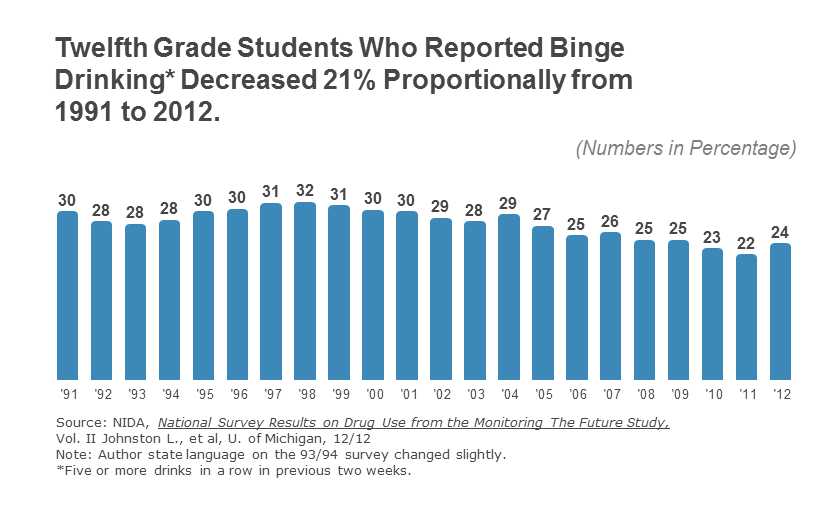Study finds small population of high school seniors binge drinking to extreme
This morning, many major news outlets reported a recent study’s findings that revealed one in 10 high school seniors are extreme binge drinking. While certainly disappointing, the fact that some high school seniors binge drink is not new information.
The study referenced in the media today analyzes data from the Monitoring the Future survey from 2005 through 2011. The 2012 Monitoring the Future survey, which is conducted annually by the Institute for Social Research at the University of Michigan and is sponsored by the National Institute on Drug Abuse at National Institutes of Health, revealed one in four 12th graders reported binge drinking in the past two weeks. While this is a slight increase from 2011, over the past two decades binge drinking among high school seniors has declined – down 21 percent from 30 percent in 1991. Further, lifetime consumption among high school seniors has decreased 21 percent proportionally from 88 percent in 1991 to 69 percent in 2012, which is a record low.
This most recent analysis did discover a disturbing trend. It revealed that a small population of high school seniors are engaging in extreme binge drinking, which is defined at two levels — as 10 or more drinks in a row in the past two weeks or 15 or more drinks in a row in the past two weeks.
While trends in alcohol consumption are usually different between high school seniors and college students, the study uncovered commonalities between the two groups in one respect. The new research analysis, using the Monitoring the Future survey data from 2005 through 2011, showed alarming similarities in the levels of extreme binge drinking between the two groups, especially among those who reported consuming 15 or more drinks in a row in the past two weeks.
The 2012 Monitoring the Future survey showed 14 percent of college students reported having 10 or more drinks in a row at least once in the prior two weeks, and 5 percent reported having 15 or more drinks in a row. By comparison, today’s study reports high school seniors are drinking at similar levels to their college-age peers — 10 percent and 6 percent, respectively. These similarities reinforce the fact that many college students bring their high school drinking habits to campus with them.
In this most recent study, the authors note, “These data suggest the importance of assessing multiple levels of binge drinking behavior and their predictors among youth to target effective screening and intervention efforts.” We couldn’t agree more, and these efforts must begin long before kids become seniors in high school.
Since research continues to show that parents are the leading influence in their teen’s decision to drink — or not to drink — alcohol, the most important intervention efforts begin at home through not only the modeling of appropriate drinking behavior in front of our kids, but also through meaningful, two-way conversation with them about the very real consequences of underage drinking and binge drinking.
While we believe these conversations should start as early as middle school or before, research continues to show that talking with teens about alcohol before the first year of college can help reduce the chance of them engaging in high-risk drinking. The same is true when these conversations continue throughout their college career. To help spur that conversation between parents and their teens, The Foundation for Advancing Alcohol Responsibility created the Parents, You’re Not Done Yet brochure, which can be downloaded free of charge here. This brochure provides information and conversation starters to help prepare parents to talk with their teens about low- and high-risk drinking.

